We’ve got a fun closed-set two parter up for Doctor Who’s next outing. What happens when you’re underwater and find yourself surrounded by ghosts? Let’s head “Under the Lake”…
Summary
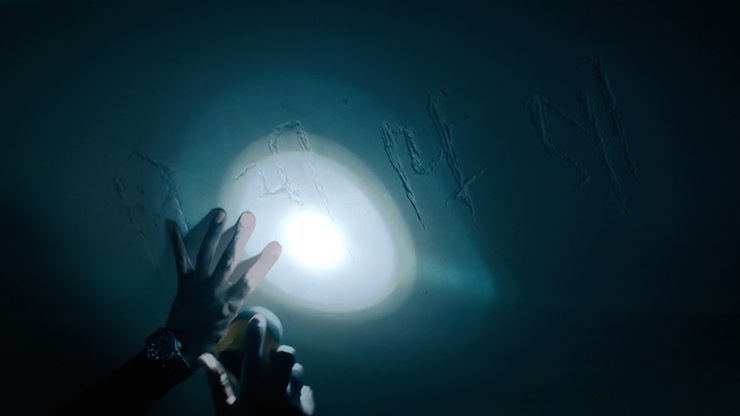
The Drum, an underwater mining facility in Scotland (in the year 2119), discovers something that looks like a spaceship under the water and brings it on board. The crew argues about where the ship came from (there’s writing etched on the wall inside it), and a fire starts in the hanger, killing their captain, Moran. The crew escapes the hangar and finds their captain and another top-hatted man as ghosts with no eyes.
The Doctor and Clara arrive on the facility and begin investigating. They find the “ghosts” and follow them into the hangar—the Doctor notes that the writing inside the alien ship hasn’t been translated by the TARDIS. The ghosts attack them with solid weapons, though they can’t carry them through walls. The Doctor and Clara find the crew in a faraday cage (put on the base because of the nuclear fission powering the place); it doesn’t let in radio waves and the “ghost” can’t get into it. The Doctor asks what’s happened and talks to the new commander, Cass, who is deaf and only speaks sign language; he thinks that he remembers sign language, but it got deleted, so he has to rely on her translator, Lunn. She explains the situation and the Doctor explains that the the top-hatted ghost is from an alien race that isn’t hostile (the Tivoli, last seen in “The God Complex”), so his murderousness doesn’t make sense. Then the base moves to “daylight time” and the ghosts disappear. They only come out at night.
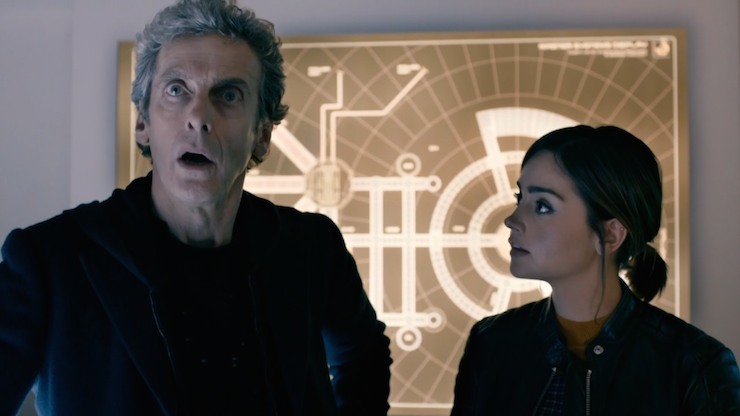
The Doctor is busy trying to ignore the man who claims he’s in charge, named Pritchard; the guy who’s company is funding the expedition in search of oil. The place where the base is stationed used to be a town, but the dam near it broke, putting the place underwater. They head back to the spaceship and the Doctor realizes that something is missing from it—a power cell perhaps— but the crew insists that they never moved anything. The Doctor considers all the facts and comes to the conclusion that that figures they’re seeing are real ghosts. He gets excited, and Clara has note cards prepared for him to apologize. The base goes back into night mode unexpectedly. Pritchard gets killed in the meantime, and becomes a ghost. Allison O’Donnell puts the base back in day mode and the ghosts disappear. They try to call a rescue submarine, but find that one had already been called—by the ghosts. They are clearly looking to create more ghosts, so the Doctor asks the topside base to cancel the rescue.
The Doctor figures that the ghosts put the base in night mode to come out and learn; something about the day mode keeps them from materializing, probably having to do with the electromagnetic locks on the doors. The ghosts are speaking, but no one can read their lips except Cass, so the crew make a plan to trap the ghosts in the faraday cage, putting the ship back in night mode. The plan works and Cass reads the ghosts’ lips. They are repeating the phrase “The dark, the sword, the forsaken, the temple.” The Doctor realizes that these are coordinates pertaining to the earth and the town.
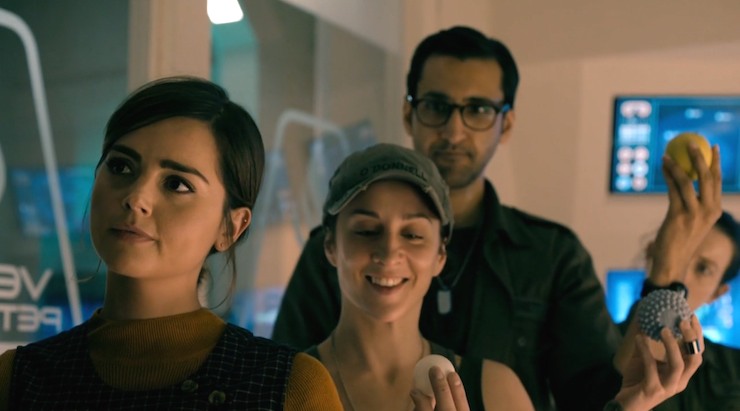
They follow the coordinates and find a deadlocked pod, possibly containing the pilot (though the Doctor isn’t convinced on that front). The murders are occurring to use people as transmitters to get the coordinates out—they are the untranslated words on the wall of the spaceship, which the Doctor compares to an ear worm, designed to get in your head and stay. Cass wants to evacuate the crew, and the Doctor suggests that she’s right, but also thinks that the crew probably wants to stay, being scientists. The base begins to flood to cool the nuclear reactor, so everyone runs to the TARDIS, but Clara, Cass, and Lunn are trapped on the other side of the corridor in the escape attempt.
The Doctor tells Clara that he has to go into the past and find out what happened when the ship landed in the town, and promises that he’ll come back for them in the TARDIS. Clara says goodbye, and insists that they’re safe when a ghost appears outside the base window. She can’t understand how one of them could have gotten out of the faraday cage until she gets a better look at the ghost—it’s the Doctor.
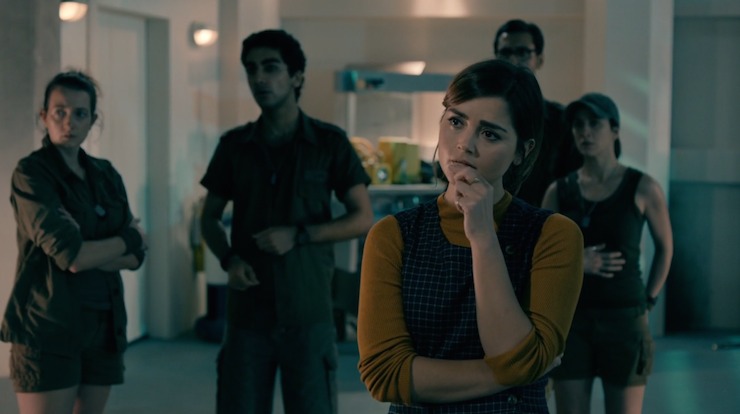
Commentary
So… bets on whether Clara is going to die at the end of the season? Or at the very least end up saved in the Library archives with River Song? (I say this because River has been confirmed for the Christmas special, and this is Jenna Coleman’s final season.) There have been several compelling arguments for Clara’s demise—one expertly hidden in the show’s recent Beatles Abbey Road crossover ad—but I think the real nerve-wracking thing we’re given here is the conversation between the Doctor and Clara on the TARDIS. The Doctor is worried for Clara; he knows that she’s getting a little too complacent, feeling too cavalier about their adventures together.
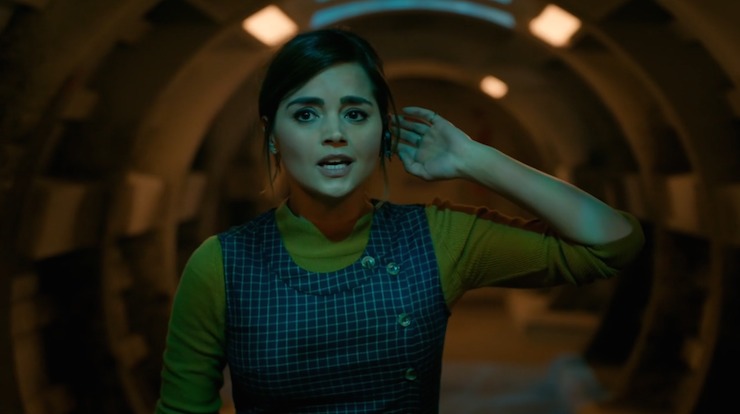
If that’s where this season is going, I’m pretty much okay with that; I think it’s an interesting point to make within the show, what can come from feeling too safe alongside the Doctor. Even the Doctor’s most doting and devoted companions have never felt as untouchable as Clara. They all had adventures where they felt certain that they had finally gone too far, but Clara seems to have moved bend that cursory regard. Maybe she’s just survived too much already, maybe Danny’s loss has altered her perception of appropriate risk levels. It’s an interesting journey either way, and since companion deaths are relatively rare on Who, it’s sure to have impact if they go that route.
This episode is the first of Toby Whithouse’s two-parter and he is, far and away, one of my favorite Who writers (and just television writers in general). He has that special knack for taking tried and true sci-fi plots and adding that special something to make them sing. In this case, the mystery is puzzling and suspenseful, and the crew of the base is diverse and engaging, so that we’re not relying on the Doctor and Clara solely for our entertainment. As underwater settings go, it’s a vast improvement over Mark Gatiss’ “Cold War,” and while two-part Who episodes don’t always play, this story actually seems as though it requires two whole episodes to pan out.
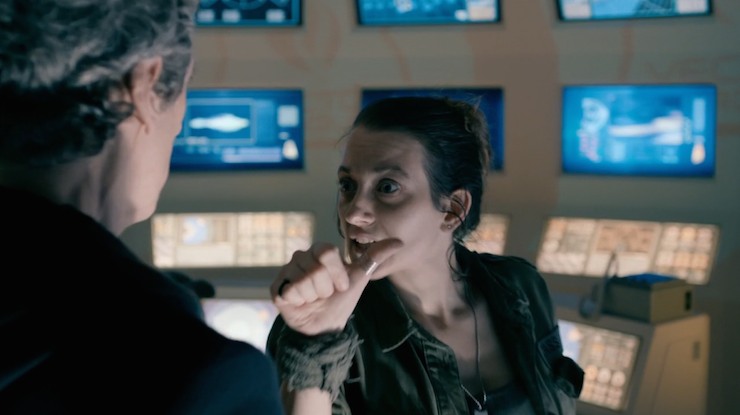
The real applause clearly belongs to Cass, the de facto commander following Moran’s death, who is a deaf woman using sign language to communicate. If I’m not mistaken, this is the first time we’ve seen sign language employed on the show, and it’s wonderfully done here; Cass has a translator for assistance, but her competence, intelligence, and ability to lead are never questioned. The Doctor respects her input and her ability to read lips proves vital to the plot without seeming too convenient. In addition, while it’s a shame that regeneration seems to have deleted the Doctor’s ability to understand sign language, the fact that he clearly knew it before points to its importance as a skill. (Moreover, it’s just as well that the Doctor can’t recall it so that Lunn continues to have a purpose within the script.) Of course, we are left with the important question—why didn’t Pritchard’s ghost kill Lunn? He had the chance and ultimately doesn’t take it. So that’s probably something for part two to clear up.
There are some fun pop culture references within the script, from ghostbusters to Shirley Bassey to Cabin in the Woods, and shout-outs to previous Who episodes as well: the Tovoli are from a previous Whithouse Who episode “The God Complex,” and the Doctor also mentions Autons, the Nethersphere, and the Flesh avatars we saw in season six. Then there were the notecards that Clara fishes out for the Doctor to help him apologize, and one of them very specifically pertains to Sarah Jane Smith; she scolds the Doctor for dropping her off in Aberdeen during “School Reunion,” another Whithouse-penned episode. (Which I guess means that Clara told him to create the cards for these occassions? Because she wouldn’t know about Sarah Jane so she couldn’t have written them herself… unless they came up with them together and she wrote them down for him? Either way, it’s easily the cutest thing that’s happened in this season thus far.)
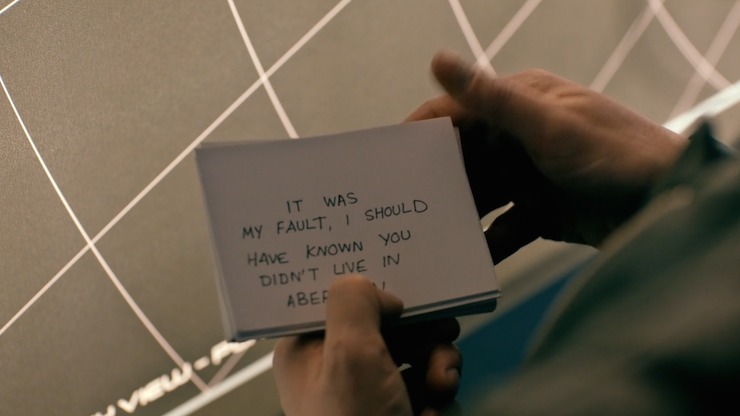
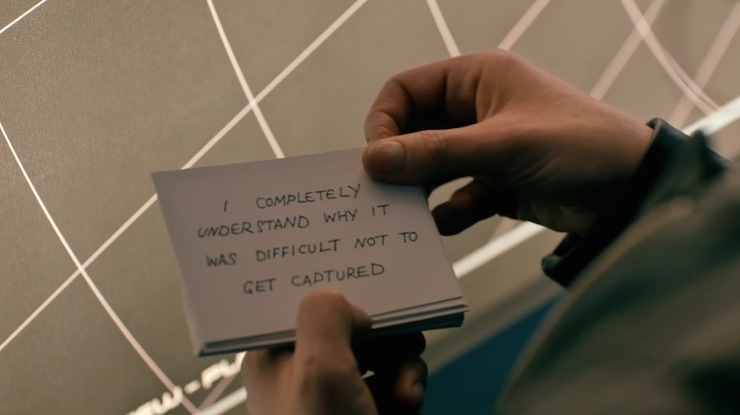
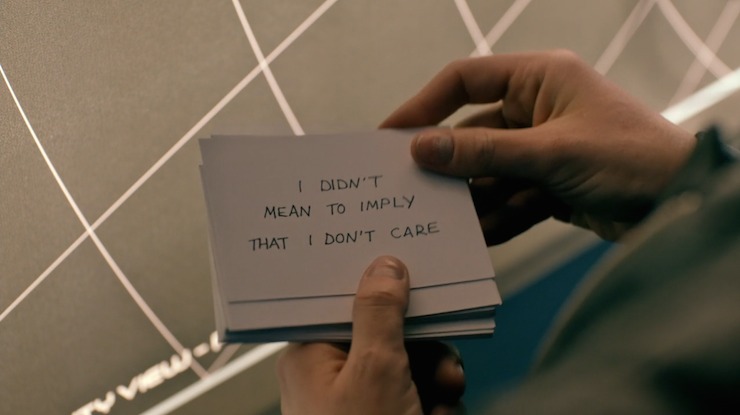
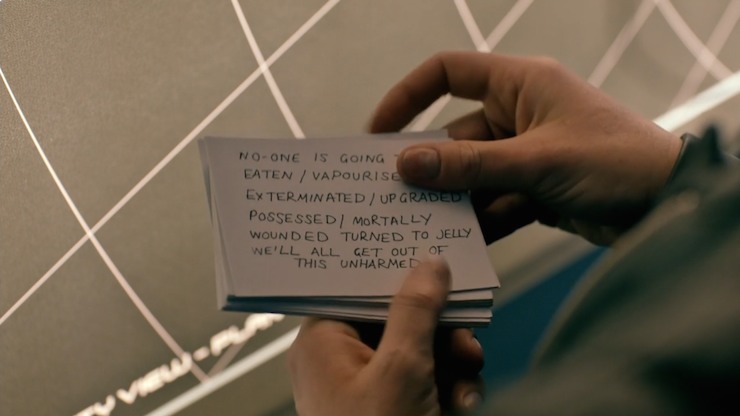
The technology in general throughout this episode was smartly executed. Taking place in the near-future allowed for a lot of thought to go into how the tech would function, and much of what we see is clearly spun from technology that already exists. It gives the episode a sheen of realism that Who doesn’t necessarily need, but benefits from all the same. The fact that the psychic paper tells the crew a relative truth for once (that the Doctor was sent by UNIT, giving O’Donnell a moment to fangirl a little since she’s heard of his work) was an extra bit of fun. I was worried that the sunglasses from the former episode were going to bother me as a piece of tech but so far they’ve proved a cool little upgrade and give the Doctor something different to do when he’s trying to piece together the puzzle.
Obviously the Doctor isn’t going to truly die, but having him show up as a ghost at the end was a good way of ramping up suspense for next week’s turn. Let’s hope that the next episode lives up to this first half—if it does, this season will be two-for-two in the success department so far.
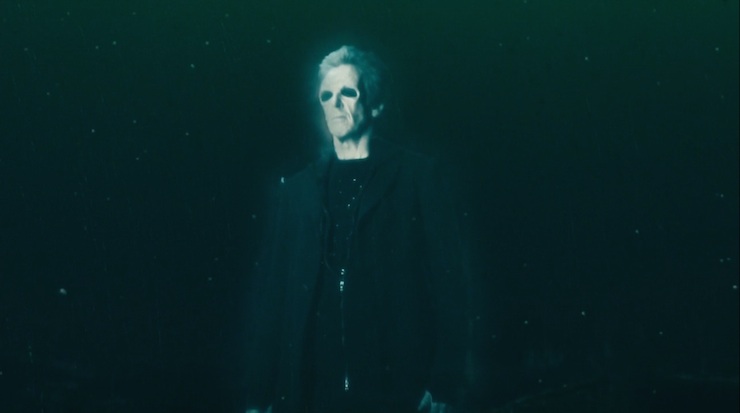
Emmet Asher-Perrin is sad that we’ll never see the Doctor read that card to Sarah Jane. You can bug her on Twitter and Tumblr, and read more of her work here and elsewhere.










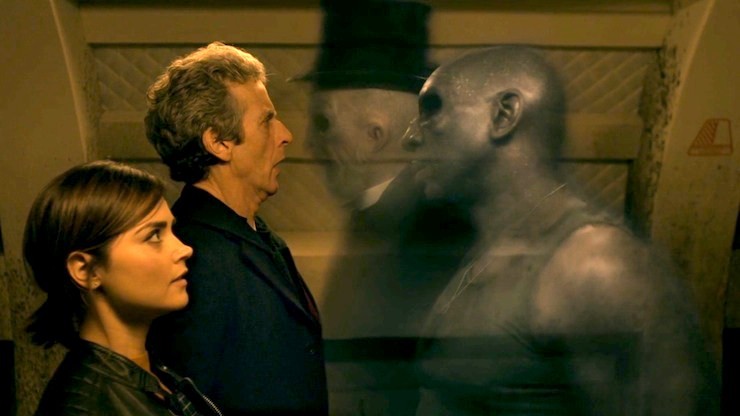
I actually don’t think that Clara is going to die. Between the increasing “Doctorness” that she’s showing and her connections to both UNIT and even Missy, I would actual more expect to see her somehow go off on her own travels separate from the TARDIS, explicitly refusing to settle back down and presenting a different sort of endgame than we’ve seen for other companions (yet one with story potential for the wider narrative: how does space-time adapt to humans investigated it as active protagonists as Gallifreyans, Daleks, and others have beforehand).
In terms of the cliffhanger, I fully expect that the Doctor is the body in the suspended animation chamber – is the signal meant to have someone come and retrieve him as a prisoner? – and the Ghost at the end marks his separation from the body’s effectively-dead state (which is kept in a condition which prevents it from regenerating, an important tool when dealing with a Time Lord, whose “death” differs from other races). A hint to me was the Cloister Bells. Those don’t go off when the TARDIS is scared but when she notes an existential threat. The Doctor chancing to open a the “coffin” with his own body would be such a threat (remember the result of the Blinovich Limitation Effect in “Mawdryn Undead” when two Brigadiers ran into each other and the introduction in “The Three Doctors” of the temporal math needed for different regenerations of a Time Lord to interact – math a TARDIS otherwise does; consider the effect on space-time of the same incarnation of an ancient Time Lord encountering himself). It makes sense that the narrative of the universe directed the flooding at the end to separate the Doctor and Clara so that she’ll need to deal with the body in the chamber and so rectify the chain of causation…
I believe the reason Lunn didn’t die is because he never saw the words inside the spaceship (Cass wouldn’t let him in), so he couldn’t be used as a transmitter after death. Remember, the first time the Doctor and Clara meet the ghosts, they’re left alone, but Top Hat leads them to the spaceship, where they see the words, then the ghosts try to kill them.
I feel like this is the first episode in a while that feels more like Classic Who than New Who. It takes its time unfolding the story, the Doctor is extra-Doctory, and it’s spread out over more than one episode. I think I read somewhere that most of the adventures this season are two-parters, and considering how well the season is going so far, hopefully that bodes well for the rest of it.
I think Lunn survived because he hadn’t looked at the letters, he hadn’t been reprogrammed by them, so the ghosts didn’t kill him because they couldn’t use them.
This makes Clara a target, though, which is fine. I like the character a lot, I think she’s the closest to a Sarah-Jane Smith level companion in the modern series.
@1 I expect Clara’s Doctorness is why she dies. She won’t survive being the Doctor anymore than Donna could. It’s a pretty bleak message, granted, but there are things out there that are bigger than us; things we can’t handle. There’s a cost in going out to see the Universe and if you don’t keep a part of yourself at home then you might not come home at all.
As to why the ghost didn’t kill Lunn. Lunn was the only crewmate who hasn’t read the script on the inside of the ship, so he could not act as a beacon upon death. The Ghosts never acted Clair or the Doctor until after they read the script. I believe the Doctor alluded to that in his explanation to the crew.
The ghost seemed to be about to kill Lunn, before he stopped – did he recognize Lunn didn’t see the letters, or did someone else stop him, like, for example, the Ghost Doctor? He must have been there the whole time, which is also (I suspect) the reason Tardis acted so strange. At that point there are two Tardises.
I was a bit annoyed at the Doctor’s “I don’t immediately know what they are, therefore they must actually be real ghosts.” attitude (particularly when they’re stopped by Faraday cages, which, I mean, come on, that doesn’t sound like a ghostly thing as much as it is a “phenomenon that relies on radio waves somehow”.
I hope that Clara does die. Death to Mary Sues! All of the flaws of Moffat’s showrunning I’ve been able to overlook for the last couple of whiles have just piled up, and I am now completely bleh about his whole run on the show. I can’t wait for him to move on, and I just hope he doesn’t feel the need to massage his ego by picking his own successor to avoid having any of his stuff retconned or the style of the show change. Come back JNT, all is forgiven (except Silver Nemesis, that can never be forgiven).
I got the impression that that explosion at the start was the first time they had seen the ghosts, so I really didn’t understand how the crew immediately understood that the ghosts only showed up during night shift.
I find Moffat hatred bizarre. He has characteristic flaws as a showrunner, and his ideas are not as fresh as they once were, but his era has been as sustained a period of excellence as Doctor Who has ever had. You have to go back to early Tom Baker to find as comparable an era. Even last season had a bunch of terrific episodes: “Mummy on the Orient Express,” “Listen,” “Flatline,” “Time Heist.”
Also, the term “Mary Sue” means nothing. If anybody is a Mary Sue, it’s someone like James T. Kirk, or Indiana Jones. And they’re awesome.
Was anyone else getting a “Fourth Doctor” vibe from Capaldi? I found myself unconsciously imagining “Tom Baker” from Capaldi’s wide-eyed performance that swung sharply between frenetic and reasonable, often laced with apparent non-sequiters, with strong hints of Baker’s abiding sense of the Doctor’s “alien-ness” in his apparent lack of emotion over death of Moran (vide Pyramids of Mars) and the need for the cue-cards.
@9
its been three weeks, I think, for the crewmembers when Clara and the Doctor show up. More than a day, at any rate.
Although I liked this episode very much, there are few things that bug me.
First, the sign language. I was so excited to see character like Cass, because I’ve been wondering for some time already: how does the Tardis translation circuit, which apparently translates millions different forms of communication, work on those sorts of languages not based on spoken word? The universe is big, there are aliens like Delphons, who communicate by raising eyebrows, so – how does that work? You speak English and they see you making funny faces? And what about sign language? And… it seems Tardis doesn’t translate it at all. I find it a bit disappointing.
And the second is actually also about the sign language: a hundred years from now, with probably at least some progress in technology, wouldn’t there be some electronic translator from (and to) sign language, so that deaf people wouldn’t depend on translators?
@13 It just so happens that Doctor Who Magazine #490 (on sale now) has a lengthy feature article titled “Lost in Translation” about the history of the series’s treatment of how and why the Doctor and his companions can communicate and understand foreign or alien languages. As might be expected, there has been much ambiguity and inconsistency over the years.
This episode reminded so, so much of “The Impossible Planet / The Satan Pit” (I don’t mean that critically by the way, it’s easily my favorite Ten and Rose story.) Very tight-knit scientific crew with well established relationships, a claustrophobic base in an inhospitable environment, untranslatable runes, a supernatural threat with religious connotations (satan and afterlife) The Doctor and his increasingly-Doctor-like companion getting split up, (presumably) causing the companion to step up and take charge. Love it.
Also, In both “The Magician’s Apprentice” and this episode I was initially fed up by this new super cavalier Clara with her leather jacket and danger seeking attitude… As such I was glad the Doctor called her out on it because it proved that the show recognizes that issue. I really hope they’re going to bring back the addiction metaphor for her life in the Tardis brought up in “Flatline.” It would be an easy way to explain her leaving if, like any other addiction, she reached a point where she realized she needs to quit.
it was rather explicitly explained why lunn wasn’t killed: as others have mentioned, he never read the coordinates.
Time travel, translation, and sonic screwdrivers work or don’t work depending on the needs of the script.
A detail:they said the village ended up at the bottom of a lake below a dam via the bursting of the dam. That just doesn’t happen, so I did what I often do with Doctor Who, and just pretended they never said anything so silly. (villages are built before dams: lakes aren’t found below a dam before it’s built: lakes don’t form below a dam after it bursts, although there can be temporary heavy flooding: rebuilding the dam and draining the lake would be far more sensible than building a base in 2119: and so on)
Another annoyance of the “isolated base” trope was they’re in a lake in Scotland in 2119! Why has communication with the outside world been confined to a single conversation about sending/not sending a sub? Imagine that much radio silence around, say, the BP Gulf of Mexico spill? Have they no family up top to be bothered that they’re not updating their Facebook statuses any more?
What I didn’t like was the underwater base connecting to the Doctor’s shades using WiFi. Come on, after a century of research and alien tech falling from the sky everywhere on Earth, there should be something better than WiFi.
I’m gonna blame it on the TARDIS translating for the viewers’ sake whatever futuristic technobabble the crew members were actually saying.
@18 Maybe whatever the tech is they still just call it WiFi?
To the Deaf community, seeing a signing Deaf commander is totally freaking awesome.
In case anyone is wondering, Peter Capaldi’s two signs were utter gibberish. Sophie Stone and Zaqi Ismail were using proper BSL, but the Doctor really has forgotten sign language, because what he signed meant nothing! (How disappointing that he couldn’t sign, though – the Deaf community would have loved that even more!)
@1: I came to the same conclusion: the Doctor hasn’t regenerated, so he died in a way that prevented it. Since he was expecting the flood (one of the known ways to kill a Time Lord as shown by Turn Left), he certainly wouldn’t have died in it, so the only other possibility is the suspended animation chamber. Also, any other means of death would leave them with a centuries old corpse to reanimate. In fact, it makes sense that using the chamber would create a ghost, as you need a first ghost in order to get the others necessary for amplifying the signal.
About Clara’s possible death, I wonder if the show will ever explain where Orson Pink comes from: with both his parents dead before he was even conceived, his existence is starting to be difficult to justify… A new spin off has been announced, but I doubt it will be centred on Clara: there wouldn’t be any point in her playing the same character exactly when she leaves the show.
I liked Cass, and I think she would have been a great character in a contemporary episode. But I wonder about the use of sign language in 2119. I know that being deaf is a culture as well as a handicap, deaf people care about sign language and some refuse to get fitted with a cochlear implant. But we can expect that in a century, this technology will be at least as good as normal hearing, and I find it strange that, considering her position, Cass doesn’t have such an implant at least as a back up: only one person on the base can understand her, so if anything happens to him, her expertise becomes lost until someone can come to repleace him.It seemed to me that Tim was rarely facing Cass when she was signing; I know that BSL relies partly on faical expressions, so I would like it if anyone who has experience with BSL could comment on that. Here’s what the wiki has to say about deafness in Doctor Who
@13: I think the sign language is translated in its Gallifreyan equivalent (like Donna’s attempts at speaking Latin were translated to Gaelic). This of course raises questions about the aliens mentioned in Flatline: the race made of sentient gas who throw fireballs as a friendly wave and the race with sixty-four stomachs who greet each other by disembowelling.
I doubt that 22nd century technology can’t be hacked by sonic glasses: there’s no way the ghosts can hack the system in a way the Doctor can’t counter.
@20 I heard they got a deaf actress to play the character, too, which is a refreshing change.
It did bug me that the Doctor didn’t immediately see that the ghosts were electromagnetic in nature, what with the Faraday cage keeping them out.
Also, it seems a bit too near-future for 2119. Shouldn’t Earth be more aware of aliens by that point? Haven’t we seen more advanced technologies in nearer futures over the series’ history? Then again, time does seem to get rewritten a lot.
@12/RandomComments: I think the caption when the TARDIS arrived said “Three days later.” Which I thought was an interesting variation on the “base under siege” formula. Usually the Doctor just happens to show up exactly when the crisis begins.
Another interesting variation was that they weren’t trapped; they could’ve left, but they chose to stay and face the danger.
@20/MeredithP: Presumably the Doctor’s signs were actually semaphore, which is what he said his knowledge of sign had been replaced with.
@23 ChristopherLBennett: Me too – though it was nice to see Doctor so excited about the “ghosts,” I don’t get how he could miss it.
Re: the too-near-future: funny is, the Fouth Doctor’s episode “Nightmare of Eden” is set in 2116, three years before this one. And there are spaceships and distant planets. But “Day of the Daleks” also happened somewhere in the 22nd century and there was some time-rewriting in it, if I remember correctly. It was very timey-wimey episode.
@20 MeredithP: Thanks, I was wondering if Doctor’s “signs” meant something or not.
@23/Christopher – Interesting possibility! There were only two signs, though, and a quick glance at semaphore doesn’t seem to match any of them, not to mention the fact that semaphore doesn’t move in the planes he used. So I think it was just gibberish, but who knows. :)
@22/noblehunter – Yes, that’s Sophie Stone, the first Deaf person to attend RADA.
@21/Athreeren – You’re correct that Lunn was not always correctly positioned for interpreting. They clearly blocked the scenes however they wanted. Friends might have had that casual positioning when chatting, but whenever his primary function was interpreting, he should have been in front of her, facing her, and preferably adjacent to whomever was talking (or in the center of a room full of people).
Such an amazing episode! I feel confident that Doctor Who has returned in force after the extremely disappointing episodes of last season.
I’ve seen Navy signalmen use a sign language version of semaphore, and trust me, the Doctor was not using semaphore.
I very much enjoyed the episode, a big improvement over the first two episodes, which I found to be overly complex and convoluted. The more they hire Toby Whithouse to write scripts in the future, the happier I will be.
And I loved the ‘pre-scripted empathy’ cue cards. That was laugh out loud funny.
Can’t wait to see next week’s episode, and see how it all works out. I suspect that the apparitions are not really spirits after all, and the Doctor’s desire to see ghosts will go unfulfilled yet again.
Here’s my question: if the base runs on nuclear fission, why/what are they mining?